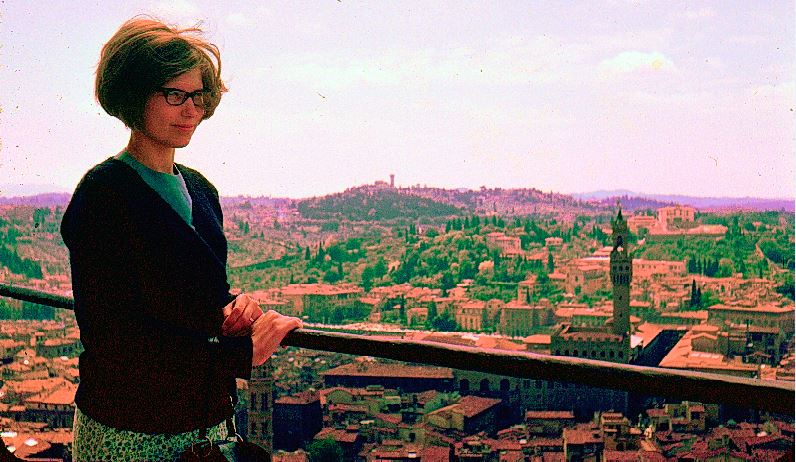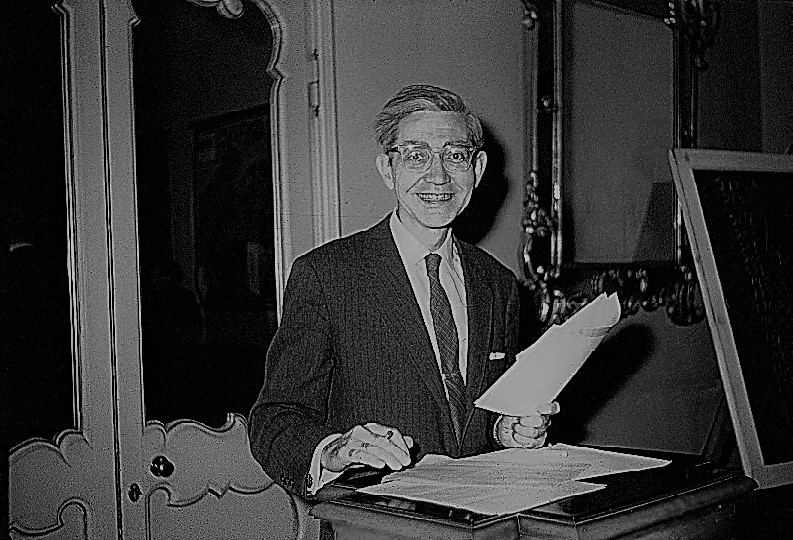
We interviewed alumna Mary Ann DuMond Kerr about her experience of the program a year after it was launched.
What semester and year did you attend Syracuse Florence?
Fall semester of 1960. I think it was the second year of Syracuse in Florence.
What were your home school (Syracuse or elsewhere) and major?
I went to Syracuse and my major was sociology.
What did you study while in Florence? What kinds of courses were offered?
Political Science, Renaissance History, Art History, Italian, and ?
What was the fieldtrip program like at the time?
We arranged our own field trips to Napoli, Rome, Venice, Siena, Pisa, Bologna, and countless trips around Florence. Dr. Fleming took us to the Uffizi and many churches to see incredible art works. The field trips probably contributed to my mediocre grades, but I learned more than books could teach me.

What is your most vivid memory of your study abroad experience?
I always think of the families with whom I stayed. One family was a Count and Countess and the other a Jewish family. They put up with my poor Italian, my late nights, crazy trips. (Dr. Adams told us that we were expected to get culture shock, not give it.) I was so grateful for the experiences they shared and would never have had such a deep experience if it had not been for them. It was not that long after WWII. One family, at great risk, had housed a Jewish family during the war, and my other family had to leave Florence quickly for a harrowing journey to Switzerland.

When I was in Florence, it was during the fear of Communism era. It was exciting to see the election banners and check out the Communist headquarters. I saved my Vota Communista poster for years. Dr. Adams later told us that whenever we climbed on a bus we would “rub shoulders and bump rumps with a Communist”.
I also remember an exhausting trip to Siena, by bicycle (I loved my rickety bicycle). We didn’t account for the mountains we would have to climb or the failing brakes going downhill or the rain which soaked us or the many hours in the dark it took us to travel 50 miles. We were exhausted but saw most everything in Siena anyway.
Dr. Adams took us to his farm where we made wine. A barrel of about 10 feet tall and 5 feet wide was filled with grapes. We climbed a ladder, jumped in, and stomped around. After awhile, we could feel warm bubbles between our toes, and then we sank up to our knees in squished grapes. Finally we had to hold onto the beams to keep from drowning in wine. My friend said, “It must have been the greatest free leg show going!” I have had a passion for wine ever since. I heard that the wine we made was very strong.
If you have been back to Florence since, what was the most glaring change you noticed?
In 1967 I introduced my new husband to my beloved families. We have visited several times since, the last was in 2009 when Syracuse in Florence had its 50th reunion. I was impressed that the school had grown so much and offered many programs. We were shown around the city by a faculty member and saw places that I had forgotten or never seen. What an education!
How did studying abroad affect your life?
I wrote to my folks, “Being here, 5000 miles away, has sure given me a chance to look at situations and life from an entirely different prospective. I’m sure I will be a better person for it, and I really want to thank you for letting me have this opportunity. I just wish I could relate in words every feeling and experience that I have had, so that you could share it with me. No matter how many pictures I show or how much I talk, I will never be able to share the full impact with anyone, not even my fellow students here, and I’m sure we will all feel the same way.”
While I was in Florence, I did a lot of soul searching about religion, relationships and my future. I left with a sense of purpose, which included a commitment to go to graduate school in social work. Since my grades weren’t great in Italy, (too much outside of school learning) I sure had to study when I got back to school. Classes were exciting and the reading inspiring. I had a real goal.
I did get my MSW at Smith College, where I was sent in the winter to Cleveland and Denver to do internships. After my time in Florence, these moves were a cinch. Again Syracuse in Italy made it easier to adjust when we moved to Kingston, Jamaica. I was the pediatric social worker at University of the West Indies Hospital. I had learned how to take risks and explore when I was in Florence, skills I used to make home visits, to confront and try to ease the pain of poverty.
How do you occupy yourself now?
I’m a retired clinical social worker and look back on the heartwarming experiences I’ve had and the people I’ve met and learned from. Most of my work was in pediatrics – parenting, child abuse, and malnutrition. I’ve also worked with sex offenders and with families coping with hemophilia.
I have also organized fundraisers for EyeWitness Palestine, which organizes trips to Israel/Palestine to meet activists and peacemakers and return to share with others what they have seen. We bring speakers to Cleveland who discuss the plight of the Palestinians and their efforts to resist military rule, imprisonment of children, demolishing houses, wounding civilians.
I have become more active in our Methodist Church especially after the discriminatory decision by the church to exclude the LGBTQ community. We are a diverse, reconciling church which means that we welcome all those who are LGBTQ people. How do we resist this anti-Christian decision?
We also visit our children in Washington, DC and Taos, NM. We have one granddaughter after years of nagging. Both are activists, our son is a history professor at American University, focusing on the homeless and social justice. Our daughter is a high school Spanish teacher and works for human rights in the Latino community.
Do you have anything else you would like to add?
Thank you for the opportunity to reminisce.
